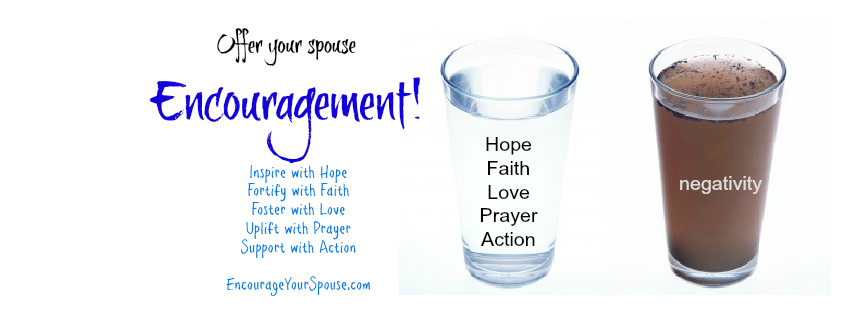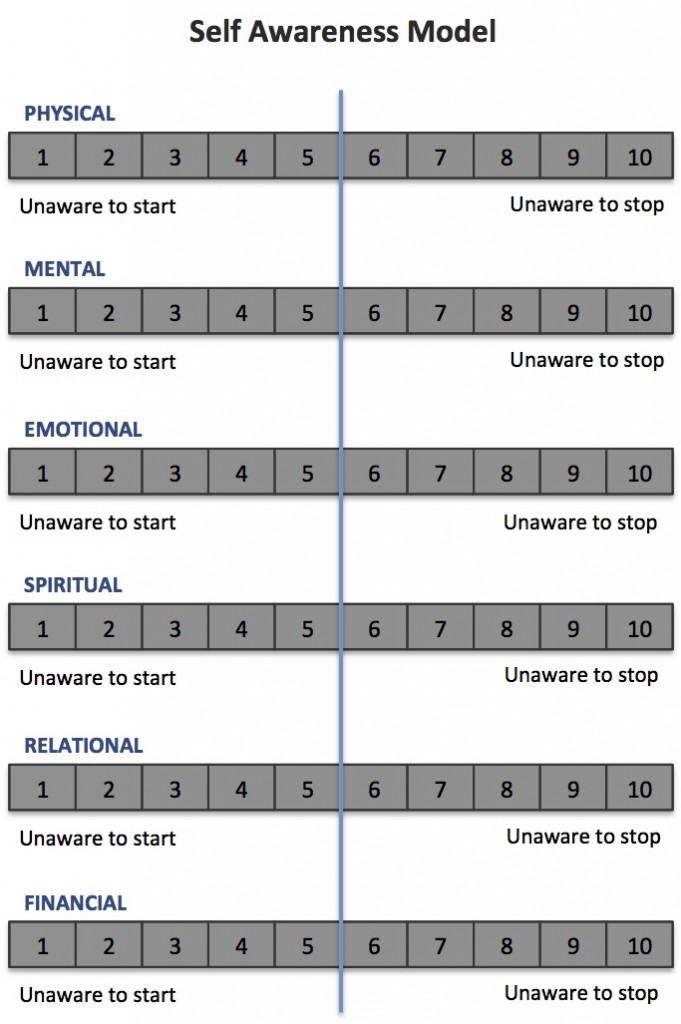Oct 22, 2012

Encouragement is like a glass of clear, clean, cold water – it refreshes.
What would you call the glass of dirty water with “floaties”?
(it’s not encouragement)
Which are you offering your spouse?

Inspire with Hope – Encouraging by looking forward with optimism.
Fortify with Faith – Encouraging by using your strong faith in God.
Foster with Love – Encouraging by loving without condition.
Uplift with Prayer – Encouraging by taking all your spouse’s concerns to God.
Support with Action – Encouraging by being that extra pair of hands to help.


Aug 1, 2012
You are a spouse.
A Wife – A Husband
In our role as husband or wife, different seasons in marriage require varying talents.
There are seasons where one spouse may wear the badge “wage-earner” and the other “child-nurturer”. Later in life we’ve seen husband or wife wear the tag “care-giver” for the other.
Being a husband – or wife – means shifting from one label to another as our path through marriage necessitates. It’s a fluid process and we’re rarely aware of the label we’re wearing.
What other labels might we wear in our role as spouse?
- head cook and bottle washer
- laundry chief
- financial guru
- killer-of-the-spiders
- maintenance maven
- food
critic tester
- jar opener extraordinaire
- chauffeur
- romantic bed-rocker
- voice-of-reason
- celebration whiz
- barbecue ace
- merriment initiator
Some tags we always wear.
In marriage there are some tags both husband and wife always wear. (I’m sure you have your list of must-haves.)
May I suggest one more?

An Advocate
An Advocate: supports, watches over, urges, defends, pleads for and champions
One of the most fulfilling volunteer experiences I ever had was as a Court Appointed Special Advocate (CASA) for children in foster care. (Another name is Guardian Ad-Litem)
Here’s what a CASA does:
“CASA volunteers are appointed by judges to watch over and advocate for abused and neglected children, to make sure they don’t get lost in the overburdened legal and social service system or languish in inappropriate group or foster homes. Volunteers stay with each case until it is closed and the child is placed in a safe, permanent home. For many abused children, their CASA volunteer will be the one constant adult presence in their lives.” ~ from the National CASA website
As a CASA I got to know the child by listening, and talking with everyone in that child’s life. No matter how many foster care homes, case-workers or schools the child experienced, I was there to pay attention to what was happening in their life. My role was to listen – then share information with the judge who would make the ultimate decision for what would be best for that child. The judge expected me to advocate – support, watch over, defend and plead – for that child. And pass all information I had on to him/her.
Spouse as Advocate
Has your spouse ever gone through moments – hours – days or months where they felt lost or neglected – when they lost their strength and became weak?
Have you stood with your spouse, listening, and caring for them with a constant heart? Have you spoken up for your spouse, perhaps in front of friends or family? Have you defended your spouse from abuse and misuse?
Have you shared with God their woes, their concerns, their heartaches? Have you asked for what they need – on their behalf?
You have been an advocate.
Advocating for your spouse is one aspect of encouragement that isn’t about cheer, or achieving goals or building. But it is about strength.
An advocate stands in the gap. An advocate bridges a gap.
Christ is our advocate.
… But if anybody does sin, we have an advocate with the Father—Jesus Christ, the Righteous One.
~1 John 2:1
Who is a better example as an advocate than Jesus? His prayer in John 17 is a beautiful example of an advocate sharing with the One who makes all decisions.
Have you ever stood as an advocate for your spouse?
Linking with Haven of Rest
Linking to Wifey Wednesdays

Jul 25, 2012
Our days begin early here at the Ferguson spot/farm/ranch/infested-with-bug-space.
(Not to worry. The bugs/spiders/creepy-crawlers are outside! If they invade my indoor space they’re dead.)

Lately we’ve been slogging through some hot and humid days so Robert goes outside before 7AM to get some exercise and wrangle the foliage that never stops growing. I sit in the sun-room and cheer him on. (Hey – it’s my quiet time!)
This morning he came back into the sun-room shortly after 8AM. He was hunched over, gasping, sweat dripping and wheezing in pain. He couldn’t talk – tried sitting – needed to stand – went back out on the deck to pour water over himself. I ran to soak a cloth in cold water to drape over his head.
It took about 10 minutes before he was feeling better.
This is not the first time he’s had this kind of reaction while working or playing. Rob is intense. He doesn’t stop. He’s determined and he perseveres. He focuses on achieving a goal and pushes till he drops. Literally.
Once the drama was done, we had a few words.
(Again, don’t worry. The words weren’t sharp or pithy – just direct. And the inappropriate ones stayed in my head. Isn’t it a blessing that only God knows what we’re thinking?)
Then Robert had something to drink and eat, and went out to put away the weapons – I mean tools. (He’d been attacking some stubborn vines and roots. He won.)
When he came back in he’d been thinking about the experience. We talked. He drew a concept that illustrated his (and my) dilemma.
In life – do we know when to stop? Or start?
Our life is measured. And it’s all about balance.

In the various areas of life – physical, mental, emotional, spiritual, relational, and financial – are we fully aware of when to start & when to stop?
The first 4 are inward focused – the last 2 look outward. Think about it…
Physical – In the physical aspects of our lives – our health, which includes exercise and eating – are we aware of when to start what will be healthy and when to stop when it becomes unhealthy?
Mental – In the intellectual aspects of our lives – a focus on thinking, and gathering knowledge and being plugged into data – are we aware of when to start thinking because we’re uninformed or when the mental aspects of our life are consuming us and we need to stop analyzing and get out of our ‘head’ ?
Emotional – In the emotional areas – feelings, and emotional health – are we unaware of when we’re being too involved with our emotions, and when we’re not involving our emotional responses at all?
Spiritual – In our spiritual life – our relationship with God, and His Son Jesus and serving or doing good – is it possible to be unaware that we’re bereft of a spiritual depth and need to start seeking? And is it possible to be unaware that we’ve become zealots with a dry well, so overcome we lack any focus?
Relational – In our relationship with others, including our spouse, what if we’re in a state of disconnection that we’re unaware we need to start a process to reconnect? Or what if all our energy and attention is on others that we have no reserve – could we become unaware that we need to put a stop to the interaction?
Financial – In our financial experiences – spending and saving – are we unaware that we need to start saving? Or the opposite, are we unaware that we’re being too frugal in a way that hurts everyone around us because our fear of lack is handcuffing our family?
Sitting in the middle?
Obviously, having a balance is important in every area. And even though we’re all struggling in some area, every day is new. There’s always another opportunity to either become aware we need to start – and work toward the middle. Or become aware we need to stop – and dial it back to the middle.
Here’s the visual Robert created…

Where are we standing on this scale?
Have you – or your spouse been taken unawares? Part of encouragement is to ask God to join you and your spouse in the journey toward awareness in all areas of life. Lift up your spouse in prayer – and don’t forget, it’s OK to ask about yourself, too!
“What should I start?” “What should I stop?”
What are your thoughts on being aware – or unaware?
Jul 2, 2012
Kindness is encouragement in action.

You may be brilliant. You may have great ideas. You might even have all the experience and education to back up your suggestions. Sharing insights and ideas is valuable in a marriage.
It’s good to have active, engaging conversations and debates.
But sometimes the kindest action you can take to encourage your spouse is not to share what you’re thinking – but rather, just listen.
When was the last time you spent time
listening
to your spouse?
Not talking.
Not thinking about what you’ll say next…
Just listening.
3 Ways to Actively Listen
- Look into your spouse’s eyes – at their face. Let nothing distract you – shift your body so you are facing your spouse. (Obviously this won’t work if you’re driving!)
- Demonstrate you’re listening. Nod. Smile. Use small verbal clues like “yes” and “uh-huh”.
- Encourage more. Use phrases like “Tell me more.” or “Help me understand” or “What did you feel/think?”
(You probably already know these ideas – but sometimes we need to be reminded of the basics.
Kindness has converted more sinners than zeal, eloquence or learning.
~ Frederick W. Faber. British Hymn Writer
Listening is one way to be kind – what other ways have you shown kindness to your spouse?
Jun 26, 2012
How can a “dis” word be an encouraging word?
We would never use the word “dis-courage”. And yet, this word – dissuade – is a synonym of discourage!
When would you not encourage your spouse?
Imagine…
Two companions, while walking arm-in-arm down a road chatting and laughing, come to a fork in the road.
Their path to this point has had some challenges – fallen logs, swamps, uphill climbs, and uneven spots. They’ve helped each other through the uncomfortable spots. They’ve given thanks for the easy, wide areas.
Now they’re at a fork.
A choice must be made. Which is the best direction?

Influence
As husband and wife, we share a bond of trust. We’ve made it through some rocky times. We’ve shared some pinnacles. There’s history.
Because we share life together and help each other over the hurdles and celebrate the wins, we are in a position to influence our spouse’s decisions one way – or another.
Most times encouragement is what is needed.
With a little push to move forward, an extra hand to help, or the belief and validation that our spouse is on the right course, we affirm a choice of direction. We put courage into our spouse.
However.
There are times when we have the responsibility to dissuade our spouse from going in a particular direction.
Dissuade = to deter by persuasion or advise against.
Do Not
Deterrence starts with paying attention to the ‘do nots’. There are a lot of “do nots” in God’s word:
- do not lie
- do not kill
- do not want what others have
- do not worship other gods
- do not withhold good
- do not love sleep (really! Proverbs 20:13)
Read Proverbs – you’ll get a bucket-load full of ‘do nots’!
(Note: As I searched through BibleGateway.com for the term “do not”, I found lots of good “do nots” also. Many of them began with “Do not be afraid…“.)
How do you decide when to dissuade your spouse from a direction?
- It goes against God’s Word. This is pretty easy to discern if you’re living your faith and you have a working knowledge of scripture. Of course, seeking input from other believing Christians will hone your understanding of scripture and what God desires from His children. You’re still fortifying your spouse with faith – but in this case you’re dissuading her or him from a direction that you’ve learned God may not bless.
- You’ve prayed about it. This one is a bit trickier. It starts with your heart and focus being right. Praying for God’s will to reign is key. Not what you believe or wish for – but for God to show direction according to His will. No more than God’s will. No less than God’s will. God’s will no matter the cost. You’re still uplifting your spouse with prayer, but the focus is on God’s will for the decision. (Oh, it’s so easy to be self-centered. This one has tripped me up – major big time.)
When else would you know to dissuade your spouse from a direction?
When is it right to advise against a direction?





















-01.png)

